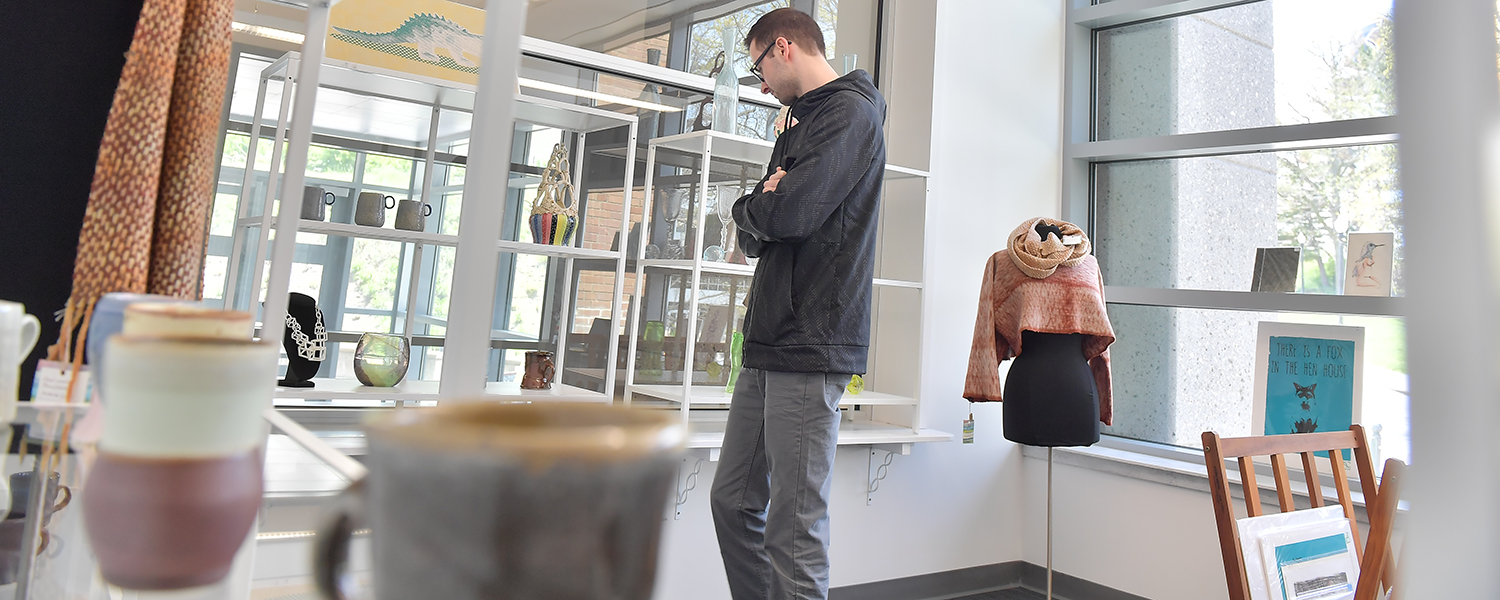Tucked into a windowed gallery overlooking the bustling intersection of the Lefton Esplanade at Terrace Drive, the new ARTshop, operated by the ôÕѿǨû§ School of Art, might be small in size but the thinking behind it is big-picture.
The store opened earlier this year in the Center for the Visual Arts as an entrepreneurial laboratory of sorts for School of Art students to display and to learn about promoting art for sale.
The approach gives students an edge in learning the business side of being an artist, says Emeritus Professor Michael Loderstedt, who was the impetus behind the ARTshopãs concept. After he co-founded and ran Kentãs Downtown Gallery in the late 1990s, Loderstedt envisioned a similar campus-based shop that would allow students to not only display their work but to run the business, as well.
ãStudents are so focused on making things that the other parts of the conversation gets lost,ã Loderstedt says. ãThe store gets them thinking about marketing and audience. Itãs good for them to see these things in practice.ã
School of Art Director Marie Bukowski says the ARTshop offers an education beyond the classroom.
ãThis shop has become a component of education in the arts that is not typically factored into a curriculum,ã Bukowski says. ãThese students have the experience to learn about the marketplace for their artwork, how to market them in their community, and put these experiences into practical use once they graduate and need to promote themselves. This Artshop is quite unique to a university setting.ã
In addition to marketing themselves, students also learn how to market and run the ARTshop. Students reap a generous 75 percent profit from sales of their own artwork, and if they are willing to volunteer in the shop a couple of hours each week, 100 percent of those sales go right in their pockets, Loderstedt says.
ãItãs a really good opportunity for students to sell their work and get their feet wet,ã says Danny Likar, one of the ARTshopãs coordinators and a School of Art alumnus. ãThey learn how to put themselves on consignment and price their work.ã
The ARTshop is run and staffed solely by students, who create all of the artwork.
ãWe accept most student art work, and we donãt turn people away if they want to sell here,ã Likar says. ãWe also give customers a variety of media to choose from.ã
Indeed, the art on display reflects the many disciplines within the School of Art ã prints, jewelry, textiles, ceramics and glass.
Another benefit from the shop, according to Loderstedt, is that it allows students to forge better connections within the School of Art.
ãAlmost every art discipline has a student club affiliated with it,ã Loderstedt explains. ãWe set it up so a student has to be a member of a club before offering up their work for retail sales.ã
Bukowski hopes the shop can become part of the student curriculum and sees the reach extending beyond Kent State.
ãI would like to see it become part of a curriculum where entrepreneurship becomes a bigger part of student learning,ã she says. ãShould it continue to grow, it could reach beyond the Kent State community, where it can have an online presence as well. Ideas like this allow for artists to connect to the local and global communities.ã
Likar says Kent State alumni also can sell their work in the store, and points to the newly acquired neon ARTshop sign that hangs in the window, which was designed by Kent alumnus and local sculptor Dana Depew.
Store hours are noon-6 p.m. on Wednesdays.

